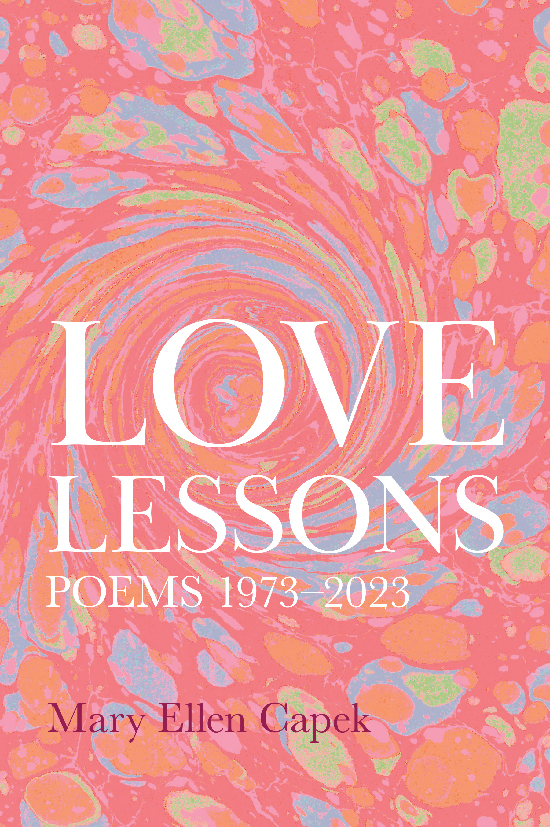
- Publication date: November 15, 2024
- 50 pages, 6″ x 9″
- Paperback
ISBN 978-0-9855200-6-9 - Ebook
ISBN 978-0-9855200-7-6
Buy at New Mexico Bookstores:
Buy Online:
Love Lessons:
Poems 1973–2023
Poems central to Love Lessons focus on language, paying tribute to Adrienne Rich and other writers struggling to realize Rich’s “dream of a common language,” essential for describing women’s lives. These poems also focus on the interconnectedness of all creation, with allusions to essential understandings of justice, human rights, and the intersections of history and politics within our day-to-day lives.
“Mary Ellen Capek’s first book of poems, Love Lessons is a sample of her brilliant mind at work on a long life spent in intellectual endeavor and joyful living. What a treat!” —Hilda Raz
“Love Lessons reminds us, in poem after poem, what it is to be alive. The poems seem written out of necessity, out of the dilemma of a life open to a world shattered by injustice and by beauty. Reading the poems I thought of Keats: ‘if poetry comes not as naturally as the leaves to a tree, it had better not come at all.’ These are poems—though artfully made—I breathed in whole. We can rejoice that, with this volume, they are now available to all.” —Kathleen Hill
“Mary Ellen shouts out her rebellion in poems and knows what to say. This volume yells, ‘This is who I am, ME!’ Retrospections of ‘Wonder Bread like paste wax smeared across the floor’ or a ‘cardboard cone stripped of sweets’ show us that lessons in love are tangible heartbreaks. These narratives, with their ‘buried wedding bands’ and dead relatives, offer to walk us home to the reality of finding new life among the dying.” —Jules Nyquist
“An extraordinary volume, Love Lessons is a book of poems by a writer who has produced award-winning books on the intersections of language with gender parity and philanthropy with ‘deep diversity.’ Here we have (as she says of a friend) ‘a sensualist of fact and awkward questions’; a recorder of ‘fragile ties that give us something tangible to share / when talk’s not easy’; and a ruthful ‘guest on edge’ during a stay with old friends whose beach-front neighbors are ‘starched smug in their opinions,’ leading ‘fearful lives’ where ‘shells of horseshoe crabs and baby mussels / surface in the muck.’ A passionate reader of poets Adrienne Rich and Anne Sexton, Mary Ellen Capek, once anxious that she might write poems ‘from another climate’ that were ‘too hot to handle,’ has given us a book that is tender and sympathetic but also clear-eyed and shot through with telling detail.” —Stephen Yenser